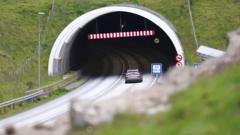The recent inauguration of the Udhampur-Srinagar-Baramulla rail link, constructed over decades at a cost of $4.4 billion, is hailed by Indian officials as a transformative achievement for Kashmir. However, many Kashmiris are wary, viewing it as a means of tightening governmental control rather than just an avenue for economic growth.
The Controversial Rail Link Connecting Kashmir to India

The Controversial Rail Link Connecting Kashmir to India
While India celebrates the new rail connection to Kashmir as a milestone, local sentiments reveal deeper concerns regarding governmental control.
In a historic development, India has inaugurated the Udhampur-Srinagar-Baramulla rail link, finally connecting the scenic yet troubled region of Kashmir to the broader Indian railway network. Unveiled after decades of extensive engineering and substantial financial investment, this railway is celebrated by Indian officials as a breakthrough in improving infrastructure and fostering economic growth within the region.
The railway line, 170 miles long and costing approximately $4.4 billion, features remarkably challenging constructions, including one of the tallest railway bridges globally and an extensive tunnel through a mountain range. The completion of this project marks a significant achievement, given the obstacles posed by the region's turbulent political history and its difficult geographical terrain.
Officials assert that the new rail service will not only facilitate tourism—allowing visitors to travel directly from major cities like Delhi—but will also bolster local businesses. Naveed Hassan, a young entrepreneur in Srinagar, expressed optimism, stating, “This will change everything. Tourists can come directly from Delhi now. Our businesses will grow.”
Despite these affirmations, the sentiments among many Kashmiris speak to a more complex narrative. While some welcome the infrastructural advancement, others view the rail link as a strategic tool for the Indian government to deepen its control over the region. The timing of the launch, amidst heightened tensions following a recent terrorist attack that had triggered conflict between India and Pakistan, has intensified these concerns, leaving a section of the Kashmiri population skeptical regarding the intended benefits of the railway.
Ultimately, as celebrations around the rail line's inauguration continue, the underlying apprehensions of the local populace highlight the intricate balance between development and governance in a region grappling with its identity within the Indian Union.



















